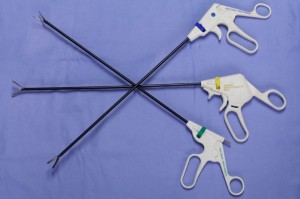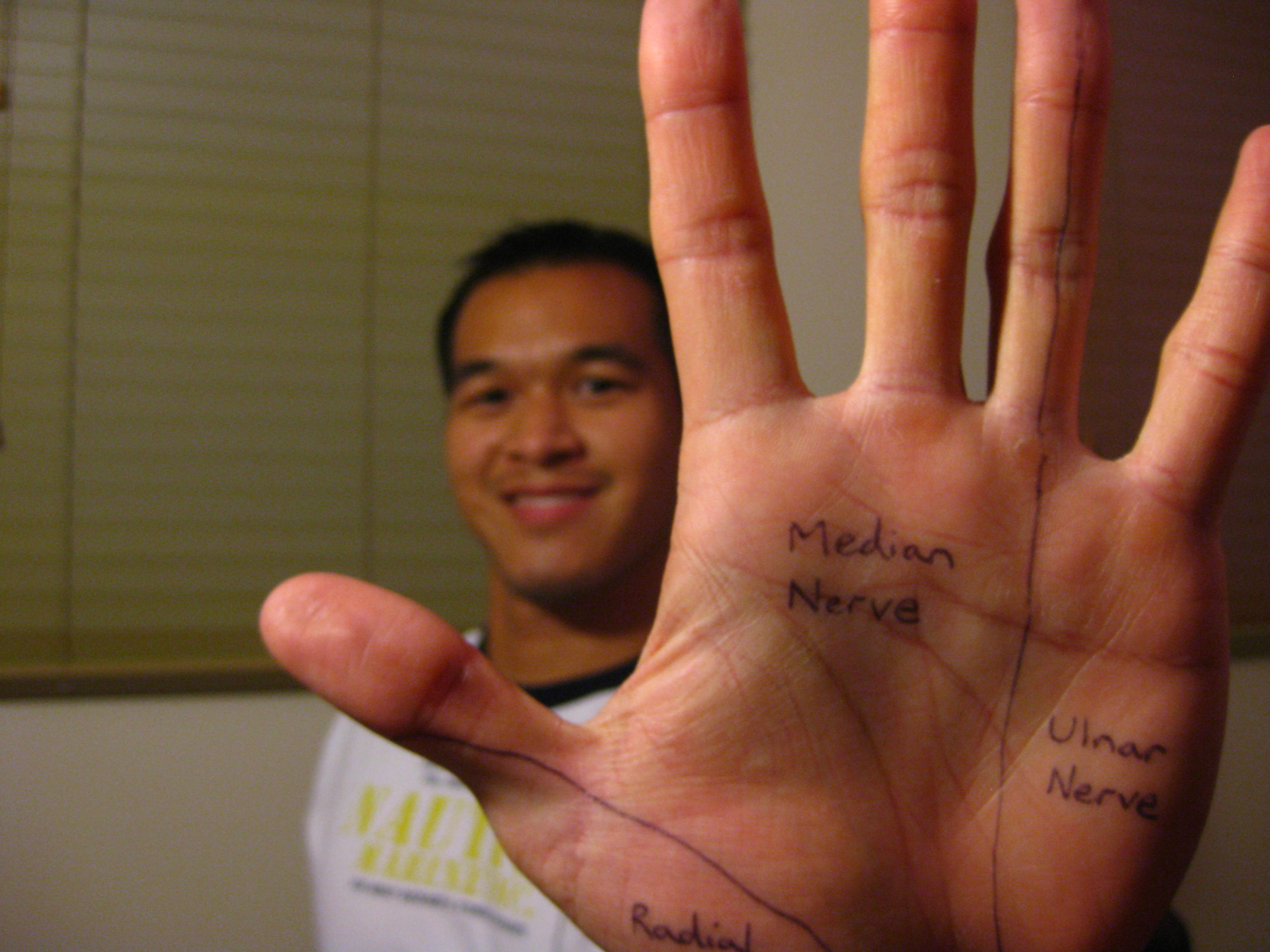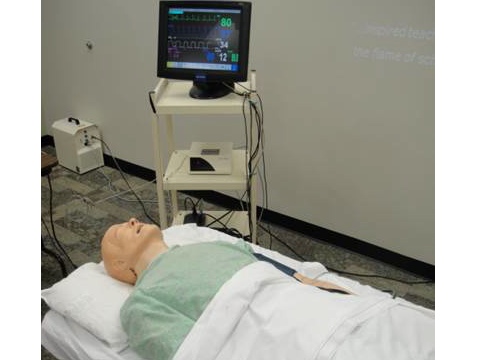Basketball Dunking Skills

“I want to see your basketball dunking skills” my attending said to me, handing me the laparoscopic surgical tools that stuck halfway out of our patient’s abdomen. I was hesitant. I had never done anything like this before. I’ve always been used to using my hands, and trusting my fingers to directly carry out my commands seemingly without thought. But with laparoscopic surgery, my hands are now these pronged rods, speared deep beneath the abdominal walls of our patient. I had to reprogram the way I understood hand control, moving these new hands that I can now only see indirectly on a TV screen. A big move of the rod to the left is actually a small move to the right, and pulling the trigger made the pinchers on the end of the rod grab things.
With only a few seconds to adjust to these new controls, I looked at the monitor in front of me and gave my best shot at hand-eye coordination. I grabbed the newly resected gallbladder and “dunked” it into a storage bag to be pulled out of the abdomen on the first try. I had just assisted in my first cholecystectomy.
Manually maneuvering laparoscopic tools with my eyes fixed to a screen felt surprisingly a lot like controlling the moves of a player on a video game with a joystick or game controller, something I never really did much growing up. It’s impressive (and beautiful) what these doctors can do with these toy-like tools, performing intricate procedures that save people’s lives. This experience made me realize that perhaps there is a useful skill to be developed in those who play a lot of video games, which I had always considered a waste of time growing up. Perhaps some of these video gamers grow up to become the great surgeons of tomorrow. Just a thought.
Every day, I’m getting more and more used to this rotation and this place. In terms of rotation, these first few weeks have been really cool… I got to scrub in and assist in an open abdominal aortic aneurysm repair, extended hemicolectomy (where they take out part of the colon due to tumor), cholecystectomies (where they take out the gallbladder), a few foot amputations, countless hernia repairs, lipoma excisions, and many other surgeries, both vascular (which is my attending’s specialty) and general. In the next few weeks, I’ll be rotating with other specialties as well, like ortho and GI, so I will hopefully get a broader experience in surgery.
My “basketball dunking” experience really wasn’t much in comparison to what my attending does every day in the OR, but it was the highlight of my week.














Hi Benji, thanks for your reviews about clinical rotations http://www.caribbeanmedstudent.com/guide-to-auc/ Did you consider attending one of the AUC clinical rotation programs that include all of the Core and some electives, or you wanted to have a greater variety? Thank you, Brian
Hi Brian, I have considered it, but personally I prefer the variety because every hospital has a different teaching style, patient pool, and organization that I feel are valuable to be exposed to. I am very thankful to have experienced first-hand the National Health Service in the UK, the severity of cases in the underserved Bronx, and the medical Spanish practice I got from Miami. Coming to the UK for rotations is especially a unique opportunity that most US and Caribbean medical students may not even have the option for. While it’s probably more convenient to stay and do all your rotations in one place, to me, I feel the benefit of experiencing the diversity of affiliated hospitals that AUC has to offer is an opportunity worth taking.
Benji
Hi Benji, I have really enjoyed reading your blog over the past year. Im glad I stumbled upon it in my search for Caribbean schools as it has certainly answered many questions and helped me decide on ultimately where I would like to apply. With luck after I take the MCAT in April I plan to apply to AUC. All of which raises the following questions.
1.) Based on your experience, is there a semester that seems to be more preferential for meeting residency application deadlines and time to study for Step I etc.?
2.) If you miss the residency application cycle how does that place you in terms of the next cycle. Are you at a disadvantage because it has taken another year? Are you able to do extra rotations to fill in the gap?
3.) Being a non-traditional student with a family, is there a semester that typically has more non-trad students
I apologize If you have already answered these questions and I missed them
Good luck in clinicals and the next step of your journey
Thanks
Will
Hi Will,
Thanks for reading my blog and good luck with the MCAT in April!
Personally, I think May and Septemebr semester is the best semester to meet residency application deadlines. If you want extra flexibility in time during your clinical years, starting in May is nice because it allows for some extra time to space your rotations from each other to study for exams, etc. For January semester, there will be too much extra time between finishing your coursework and starting your residency, especially if you are required to pay back your federal student loans within 6 months after graduation. During that period of waiting, some people find work, research, or do externships. Generally, students don’t do extra rotations. For September semester, there won’t be as much extra time between rotations as you would with the May semester, but it’s certainly enough time to finish everything before starting residency. If you start May or September 2013, you’ll apply for the 2017 Match. If you start January 2014, you’ll be applying for the 2018 match.
AUC has quite a few non-traditional students in all the semesters. The Spouses Organization at AUC is quite helpful in getting spouses and families settled in.
Best of luck!
Benji
Hi Benji,
I really enjoy reading your blog. Currently I am applying to AUC. Your clinical experiences in UK sound amazing? Are AUC students eligible for US dept of education federal aid while doing clinicals in the UK?
thanks!
Katie
Hi Katie,
Yes, since we are still AUC students when we go to the UK, we are still eligible for US Federal Student Aid.
Benji
Hi Benji,
Foremost, thank you so much for taking your time to post; your blog is great, and overall really inspiring.
I will be touring JABSOM medical school in a couple weeks with a few other high school students, and I was wondering what questions you suggest I ask. We will get the opportunity to be with cadavers in the anatomy lab, and our supervisors are counting on us to inquire relevant and significant questions. Anything at all would be great. Thank You!
Hi Jennie! Thanks for visiting my site! Are you touring the medical school as a potential student or for something else (like a school field trip)? What are you going to do in the cadaver lab? Who are your supervisors? Are they teachers who are grading you for going on this field trip? The types of questions you ask depends on your purpose of going and what you want to get out of it. 🙂
Hi Benji,
Long time reader, first time poster….I thoroughly enjoy your blog and your youtube videos. Really informative and thank you for the time and effort you have vested in creating them. I am a nontrad student with family currently applying to AUC. I have few nagging questions and if you have blogged about these topics or answered some place in your blog, I do apologize for the redundancy.
1) With the prematch closed as of Sep 2012, how will it affect future caribbean students residency. Do you think this is a move toward a better residency slots or to the worse?
2) With the constant increase of US med school students, the so called “1:1” student:residency spot ratio by 2016, your thoughts on this.
I have read seceral blogs in both valueMD and student doctor network regarding these topics and most of them are only gloom and “sky is going to fall” answers. I have found very few insightful responses. As a current caribbean student and a future resident, could you give us your valuable thoughts?
Thanks in advance,
Jerry.
Hi Jerry,
Thanks for visiting my blog and great to hear from a prospective medical student. Since Sept 2012, they’ve changed the rules so that residency programs have to either fill their spots via match only or via prematch only. So because of this, there is still pre-match, but only at certain hospitals who chose to only hire via pre-match. Bronx-Lebanon hospital, where a lot of AUC students rotate at, is one of these hospitals. I’ve had a few friends this year who have pre-matched. As with the increasing 1:1 student-residency spot ratio, it seems like it will get harder for everyone, including US students, but for sure it will get harder for Caribbean students. This means we’ll have to score higher and do better than our US counterparts to be competitive, and a lot of students here are doing just that and matching.
Benji
Hello again, and thanks for replying! I should’ve been more descriptive, but to answer your questions…
I will be representing an organization, along with 9 other students who are considering the medical field. We are traveling inter-island to present at a conference unrelated, and this was sort of a last minute arrangement, so I’m not sure what we’ll be doing :/
We aren’t being graded, but the supervisors do observe and note how we do.
In the past, JABSOM had a school group that didn’t ask any questions, and the doctors felt it was a waste of time, so being on behalf of the program, we have to be prepared and show more participation sonthe org. is welcomed back. As an incentive, the student who displays the best involvement throughout the whole day gets to present first. Although I don’t really care about that, I would like to make a good impression, since we do plan on seeing them again in the summer.